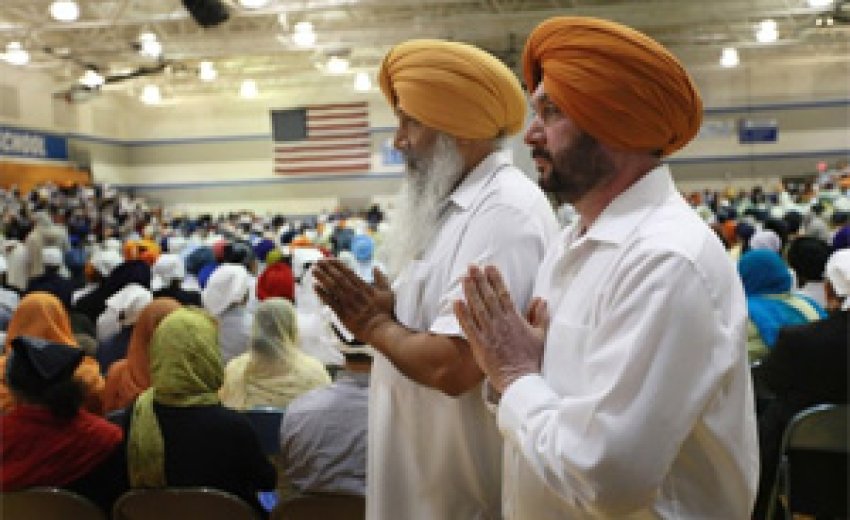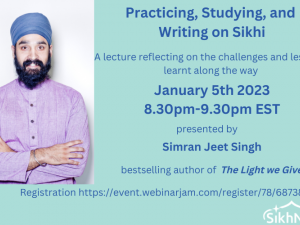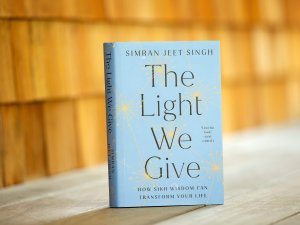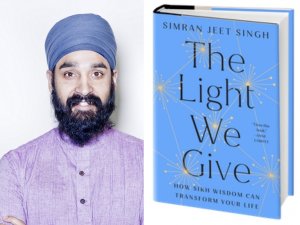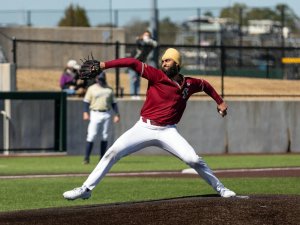
Family and friends and community members gather at Oak Creek High School to mourn the loss of 6 members of the Sikh Temple of Wisconsin on August 10, 2012 in Oak Creek, Wis. (GETTY IMAGES)In the wake of the massacre at the Sikh gurdwara [house of worship] in Milwaukee, Americans are learning about Sikhs, many for the first time. As two Sikh Americans who have studied and advocated on behalf of our community for the last decade, we were at first encouraged by the national media attention – but now we’re a bit worried.
We hear reporters and officials describe the attack as a case of “mistaken identity,” that Sikh Americans are targeted in hate crimes because they have been confused with Muslims. While it’s true that perpetrators of hate violence against Sikhs tend to harbor hatred for Islam and Muslims, identifying the problem as “mistaken identity” is just plain wrong. “Mistaken identity” implies that there is a “correct” target, and it further implies that hate violence should rightfully be directed at Muslims. This is absolutely unacceptable.
“Mistaken identity” also misses the bigger picture: we must end violence against all innocent people – Muslim, Sikh, and anyone else – and build a world without terror.
We believe it would not have mattered much to Wade Michael Page if he knew that the people he killed were Sikh rather than Muslim. From what we have gathered so far Page looked at people with dark skin, beards, and turbans as the enemy. A difference in terminology would not have stayed his finger on the trigger. Immediately after Sept. 11, 2001, Frank Roque was arrested for murdering Balbir Singh Sodhi, a turbaned Sikh man, and Roque publicly declared himself to be a patriot. We can imagine Page, a self-avowed white supremacist, invoking the same sense of righteous defense.
The notion of “mistaken identity” is not just wrong, it’s dangerous. In the initial aftermath of 9/11, Sikhs told the media, “Sikhs are not Muslims.” Our community quickly realized its mistake, and made a commitment to express solidarity with Muslims. Although we are distinct religious communities, we have shared in the experience of hate violence, religious bigotry, and racial profiling. Sikhs stand with Muslims in solidarity, just as they have stood for us, in the wake of hate attacks against us.
We all sense that the Milwaukee massacre is about far more than Sikh or Muslim bigotry. The attacks shock our conscience, violate our deepest values as Americans, and threaten our shared security. They are also an attack on all people of faith who gather like Sikhs to worship as a community. None of us should ever fear gunfire in a place where we gather to pray.
It’s also time to connect the dots. The deaths of Trayvon Martin,Matthew Shepard, Balbir Singh Sodhi, and the Sikh Americans in Wisconsin all rise from the same crisis in our social fabric: individuals driven by fear and hatred of people different from them believe senseless acts of violence are warranted and justified. In the context of a struggling economy and polarized election season, when people can easily access guns to express their rage, we call upon our government and our neighbors to do everything in our power to combat all terrorism in the name of hate.
But hate violence is only the publicly played out tragedy. Stereotyped communities face hardships every day. We must recognize the ongoing, daily struggle of people cast as “other” in the eyes of their neighbors: African Americans are stereotyped as “criminal,” Latinos as “illegal immigrants,” LGBTQ people as “sinners,” and Muslim and Sikh Americans as “terrorists.” We must renew our commitment to create an America where we are all seen and treated as fellow human beings. We must recognize that we all have a stake in this fight.
Through the course of our country’s history, from native to new Americans, we have had to push hard to expand the circle of “who counts” as American. The Sikh struggle is a part of this American story. We have only made progress when we have fought alongside one another in solidarity – from “Irish need not apply” to women’s suffrage, the civil rights movement, and present-day efforts to fight for equal justice. While our communities are different, we are bound together in the singular struggle for human dignity.
Let’s retire the term “mistaken identity” and renew our commitment to end violence against all people. Only then can we recommit to building a world and an America where all can live, work, and worship in safe and caring communities. The terror in Wisconsin calls upon us to honestly face this senseless national tragedy. We can start by mourning together, expressing our love and support at vigils across the country this week, and end the notion of hate crimes as “mistaken identity.”
Valarie Kaur, an award-winning filmmaker, legal advocate, and interfaith organizer, is founding director of Groundswell, a multifaith initiative. Her documentary “Divided We Fall” is the first feature film on hate crimes against Sikh Americans after 9/11. You can follow her on Twitter at@valariekaur.
Simran Jeet Singh is a doctoral candidate in the Department of Religion at Columbia University and deputy director for the Sikh Spirit Foundation. He also serves on the advisory board for the Sikh Coalitionand the International Center of Advocates Against Discrimination. Follow him on Twitter at @SimranColumbia.

